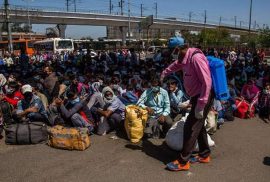Image Courtesy: Catholic News Agency
by Dr Abhishek Royal and Dr Marcelo Amaral Mali.
The entire world is tirelessly making efforts to stop the spread of SARS Coronavirus 2 and end COVID-19 pandemic. The sight of firefighters spraying disinfectants on roads and buildings using high pressure pump trucks or drones spraying chemicals from sky gives an extreme sense of security to most of us. The provisions of drenching people/workers who are travelling back from affected areas with disinfectants through hose pipes and strict execution of norms to use disinfectant tunnels by general public at public places and disinfectant chambers by health professionals while entering or leaving the health facility are continuously sighted in various parts of the world.




